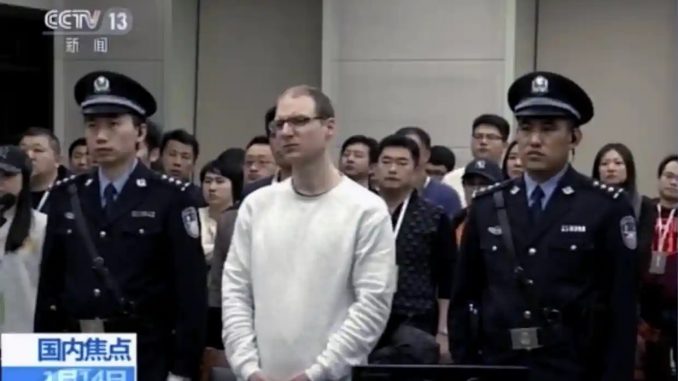
Conservative Leader Erin O'Toole is accusing China of condemning Canadian Robert Schellenberg to death in retaliation for Ottawa's arrest of a Huawei executive.
His comments come as Canadian businessman Michael Spavor awaits his own verdict in China hours from now in a case that Canada has criticized as "hostage diplomacy," and also appears to be a tit-for-tat move by Beijing.
Mr. O'Toole, speaking to reporters in Oakville, Ont., Tuesday morning, was responding to a Chinese court's decision Tuesday to reject an appeal by Mr. Schellenberg of a death sentence for drug trafficking.
He said the Chinese are making legal decisions to suit their political needs.
The denial of Robert Schellenberg's appeals must be seen for what it is a foreign government planning to take the life of a Canadian for political reasons. The use of the death penalty is bad enough, but to impose it for political reasons is inexcusable.
Mr. Schellenberg had originally been sentenced to 15 years’ imprisonment for this offence in November, 2019, but just weeks after Canada arrested Huawei executive Meng Wanzhou on a U.S. extradition request his case was reopened.
He was ordered to face retrial, after prosecutors, citing the emergence of new evidence, alleged that he was involved in organized international drug trafficking, a crime whose maximum sentence is execution.
Mr. Schellenberg, in his late 30s, was tried again and, in January 2019, found guilty of conspiring to traffic 222 kilograms of methamphetamine. He was sentenced to be executed. Prime Minster Justin Trudeau’s government has called his retrial and the sentence arbitrary
The abrupt revision to Mr. Schellenberg's sentence in early 2019 and the seizure of Canadians Michael Spavor and Michael Kovrig in late 2018 – all apparently linked to Ms. Meng's case have drawn protests from Canada. Robert Oliphant, a parliamentary secretary to the Minister of Foreign Affairs, has called the arrests of Mr. Kovrig and Mr. Spavor targeted abductions.
Mr. Spavor, a businessman, and Michael Kovrig, a former Canadian diplomat, were both seized by Chinese state security agents on December 10, 2018, in apparent retaliation for the detention of Huawei executive Meng Wanzhou in Canada on a U.S. extradition request.
September 4 this year will mark 1,000 days since Mr. Spavor and Mr. Kovrig were locked up by China.
A Chinese court is expected to announce the verdict for Mr. Spavor at around 10 a.m. Chinese Standard Time Wednesday, which is 10 p.m. Eastern time in Ottawa.
Ms. Meng, meanwhile, is free on bail in Vancouver, as she fights the U.S. extradition request.
Chinese authorities have accused both Mr. Spavor and Mr. Kovrig of violating state secrets laws, but have made public no evidence of their alleged wrongdoing.
Neither man has been granted bail.
China's conduct has drawn criticism from many Western nations which have spoken out in support of Canada. Mr. O Toole reminded China that all eyes will be on the Spavor verdict. The Chinese Communist Party needs to know that the world is watching.
There is no word yet on when China might announce a verdict for Mr. Kovrig.
Mr. O’Tool said he’s not sure that Canadian athletes will be safe if they travel to China in early 2022 for the Winter Olympic Games, being hosted by Beijing.
Canadians just enjoyed celebrating the amazing achievements or our athletes in Tokyo. I know how hard our athletes are training for Beijing, but we are approaching a point where it won’t be safe for Canadians including Olympic athletes – to travel to China. The outcomes of the Spavor and Kovrig cases will help us answer that question.
Mr. Spavor is imprisoned in Dandong, a city where he had been living that is located on the border with North Korea. He has, in correspondence with family, requested sleeping masks, which suggests he is being kept in a facility with 24-hour lighting.
He underwent a secret, two-hour trial in March this year in Beijing. The court declined to issue a verdict or sentencing at the time. Canadian diplomats had asserted their consular rights to attend the trial but China barred them from the proceedings.
Canada has condemned the latest Schellenberg verdict and Canadian ambassador to China Dominic Barton said it is “not a coincidence� that Chinese authorities announced their verdict as Ms. Meng’s case continues in Vancouver.
Legal experts s ay the brevity of Mr. Spavor's trial indicates certainty by the court about the charges and suggests a light sentence is unlikely.
Canada had strongly criticized China for holding the trial without allowing Canadian officials access to the court or evidence.
“Their arbitrary detention is completely unacceptable, as is the lack of transparency around these court proceedings, Prime Minister Justin Trudeau said in March.

Be the first to comment